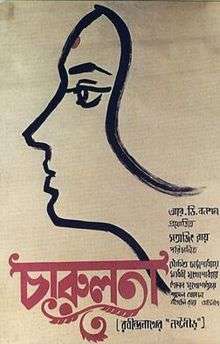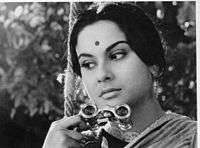Charulata
| Charulata | |
|---|---|
 A poster for Charulata. | |
| Directed by | Satyajit Ray |
| Produced by | R.D.Bansal |
| Screenplay by | Satyajit Ray |
| Based on |
Nastanirh by Rabindranath Tagore |
| Starring |
Soumitra Chatterjee, Madhabi Mukherjee, Sailen Mukherjee, Syamal Ghosal |
| Music by | Satyajit Ray |
| Cinematography | Subrata Mitra |
Production company |
R.D.Bansal & Co. |
| Distributed by | Edward Harrison (US) |
Release date |
|
Running time | 117 minutes |
| Country | India |
| Language | Bengali with some English |
Charulata (Bengali: চারুলতা Cārulatā; in English also known as The Lonely Wife) is a 1964 Indian Bengali drama film written and directed by Satyajit Ray based upon the novella Nastanirh ("The Broken Nest") by Rabindranath Tagore. It features Soumitra Chatterjee, Madhabi Mukherjee and Sailen Mukherjee.
Plot
Charulata is based on a story by Rabindranath Tagore, Nastanirh (The broken Nest) and set in Calcutta in the late nineteenth century. Bengal Renaissance is at its peak and India is under British rule. The film revolves around Charulata / Charu (Madhabi Mukherjee), the childless, intelligent, and beautiful wife of Bhupati (Sailen Mukherjee). He edits and publishes a political newspaper. Bhupati is an upper class Bengali intellectual with a keen interest in politics and the freedom movement.
Charu is interested in the arts, literature and poetry. Though Bhupati loves his wife, he has no time for her. She has little to do in the house run by a fleet of servants. Sensing her boredom, Bhupati invites Charu's elder brother Umapada and wife Manda to live with them. Umapada helps in running of the magazine and the printing press. Manda with her silly and crude ways is no company for the sensitive and intelligent Charulata.
Amal (Soumitra Chatterjee), Bhupati's younger cousin comes on a visit. Bhupati asks him to encourage Charu's cultural interests. Amal is young, handsome and is of the same age group as Charu. He has literary ambitions and shares her interests in poetry. He provides her with much needed intellectual companionship and attention. An intimate relationship develops between Charulata and Amal. There is a hint of rivalry when she publishes a short story on her own without his knowledge. He realizes that Charulata is in love with him but is reluctant to reciprocate due to the guilt involved.
Meanwhile, Charu's brother and sister-in-law who were guests in the house swindle Bhupati of his money and run away. It destroys Bhupati's newspaper and the press. The episode shatters Bhupati who admits his hurt to Amal. He tells Amal that now Amal is the only one he can trust.
Amal is overcome with guilt of betraying his cousin. He is also uncomfortable with Charu's higher intellect that he has helped nurture. He leaves unannounced, to marry and go away to England for higher studies. He leaves behind a letter to Charu.
Charu is heartbroken but hides her disappointment. Bhupati accidentally enters her room and finds her crying over Amal. Bhupati realizes Charu's feelings for Amal. He is broken, shocked and bewildered by it.
He rushes out of the house, wanders aimlessly in his carriage. On his return, Charu and Bhupati make a hesitant gesture to reach out, but their extended hands remain frozen in a tentative gesture.
Cast
- Madhabi Mukherjee - Charulata
- Soumitra Chatterjee - Amal
- Shailen Mukherjee - Bhupati Dutta
- Shyamal Ghoshal - Umapada
- Gitali Roy - Manda
- Bholanath Koyal - Braja
- Suku Mukherjee - Nishikanta
- Dilip Bose - Shashanka
- Joydeb - Nilotpal Dey
- Bankim Ghosh - Jagannath
Production
Charulata is based on the 1901 novella Nastanirh (The Broken Nest) by Bengali author Rabindranath Tagore.[1] Ray later said that he liked the novella because "it has a western quality to it and the film obviously shares that quality. That's why I can speak of Mozart in connection with Charulata quite validly."[2] Ray decided to set the film in the 1880s instead of in 1901 and spent many months researching the historical background. For the first time in his career he worked without a deadline both during pre-production and during the shooting.[3] Ray worked closely with art director Bansi Chandragupta and no interior scene was shot on location. All sets were either built or remodeled to accurately portray India in the 1880s. Ray cast Indian actress Madhabi Mukherjee in the role of Charulata, but had difficulty with her owing to her addiction to chewing paan, which stained her teeth black. Because of this Ray had to be careful about what camera angles he used to film her.[4] Ray once called Charulata his favourite of his own films.[5]
Reception
Charulata holds one of the highest ratings for an Indian film in Rotten Tomatoes, a 96% 'fresh' rating based on 26 reviews with an average rating of 9.2/10.[6] It also holds an 8.3/10 rating on IMDb. It has been widely regarded as one of the finest films made in Indian cinema history, and has won wide critical acclaim overseas as well.
In Sight and Sound, Penelope Houston praised the film, stating that "the interplay of sophistication and simplicity is extraordinary".[7] A review in The New York Times said that the film "moved like a majestic snail, as do all Ray films".[5] In 1965, The Times of London remarked upon the film's depiction of values that seemed influenced by the English, stating that "this stratum of Indian life was more English than England".[5]
Much to Ray's dismay, the film was rejected at Cannes, a move which was protested by the likes of David Lean and Ingmar Bergman.[8] The film is, supposedly, also an all-time favourite of Jean-Luc Godard.[8]
It was shown as part of the Cannes Classics section of the 2013 Cannes Film Festival,.[9] It was awarded Best Director by the Berlin Film Festival.[10]
Preservation
The Academy Film Archive preserved Charulata in 1996.[11]
Awards
- Silver Bear for Best Director at the 15th Berlin International Film Festival in 1965.[12]
- Golden Lotus Award for Best Film at the National Film Awards (India) in 1965.
Tribute

The film contains a famous scene in which Charu (Madhabi Mukherjee) sings Rabindranath Tagore's song "Fule Fule Dhole Dhole" on a swing, while looking at Amal (Soumitra Chatterjee). The scene is referenced in the Bollywood film Parineeta during the song sequence, Soona Man Ka Aangan. Indeed, Parineeta 's Lalita (Vidya Balan) is dressed to resemble Nastanirh/Charulata 's Charu. Furthermore, Parineeta is based upon the novel Parineeta by Sarat Chandra Chattopadhyay who was a noted contemporary of Tagore (and who also wrote novels concerned with social reform).[13][14]
Home media
In 2013, The Criterion Collection released a restored high-definition digital transfer and new subtitle translations.[15]
References
- ↑ Robinson, Arthur. Satyajit Ray: The Inner Eye. Los Angeles: University of California Press. 1989. ISBN 0-520-06905-6. pp. 159.
- ↑ Robinson. pp. 160.
- ↑ Robinson. pp. 161.
- ↑ Robinson. pp. 162.
- 1 2 3 Robinson. pp. 157.
- ↑
- ↑ Robinson. pp. 156.
- 1 2
- ↑ "Cannes Classics 2013 line-up unveiled". Screen Daily. Retrieved 2013-04-30.
- ↑ Malcolm, Derek (22 August 2014). "Charulata". London Evening Standard. p. 43.
- ↑ "Preserved Projects". Academy Film Archive.
- ↑ "Berlinale 1965: Prize Winners". berlinale.de. Retrieved 2010-02-20.
- ↑ Gupta, Pratim D. (2005-06-11). "The Telegraph - Calcutta : Nation". Calcutta, India: Telegraphindia.com. Retrieved 2011-05-31.
- ↑ "Magazine / Lifestyle : Something new, something old". Chennai, India: The Hindu. 2005-08-07. Retrieved 2011-05-31.
- ↑ "Charulata: "Calm Without, Fire Within" – From the Current – The Criterion Collection". Retrieved 2015-03-19.
Further reading
- Antani, Jay. "Charulata review." Slant Magazine, April 2004.
- Biswas, Moinak. "Writing on the Screen: Satyajit Ray’s Adaptation of Tagore"
- Chaudhuri, Neel. "Charulata: The Intimacies of a Broken Nest"
- Cooper, Darius.The Cinema of Satyajit Ray:Between Tradition and Modernity Cambridge University Press, 2000.
- Nyce, Ben. Satyajit Ray : A Study of His Films. New York: Praeger, 1988
- Seely, Clinton B. "Translating Between Media: Rabindranath Tagore and Satyajit Ray"
- Sen, Kaustav "Our Culture, Their Culture:Indian-ness in Satyajit Ray and Rabindranath Tagore explored through their works Charulata and Nashtanir"